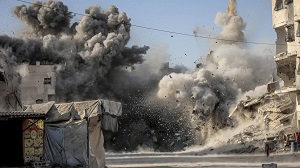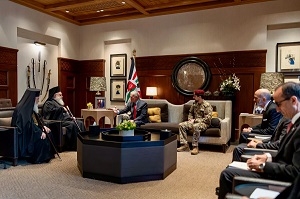A Syrian Ray of Hope in a German Court? - By Elias Harfoush, Asharq Al-Awsat
Justice will not bring the Syrian regime’s victims back to life, and it will not alleviate the pain suffered by those who were tortured by the criminals who work for that regime. However, justice opens a window of hope, no matter how small, that the crimes will not be repeated and that those who committed them will reap what they sow.
Commenting on the German court of Koblenz convicting of Iyad al-Gharib, a victim of torture in the Assad prisons says: “I hope that I would manage to sleep better this night and that the other victims would manage to sleep too;” the man means that impunity for the crimes committed by the regime equates to rewarding it for what it had done.
On Iyad al-Gharib’s four and half year prison-sentence, German Foreign Minister Heiko Maas said: “It is the first verdict that holds those responsible for torture in Syria accountable, and it sends a message to this regime that its actions will not go unpunished.
A message to this regime? It is easy to get carried away with far-fetched hopes based on the minister’s statements. But the ten years since the “revolution” began have taught us that excessive optimism about the potential for the materialization of criticism of the Syrian regime is not always founded.
All the bets on the untenability of this regime’s maintenance of its power after it spilled blood of at least half a million Syrians, in addition to the hundreds of thousands of wounded and millions displaced- who outnumber those displaced during the Second World War- were not founded on reality, as it became apparent.
Nonetheless, Germany and its court dared to do what others had not. By giving precedence to the principle of universal jurisdiction, it has allowed for the prosecution of those guilty of committing these crimes outside Germany’s borders as well. The German court’s ruling is founded on the premise that Syrian citizens’ lives have value and that those who committed crimes against them must pay the price. Although Iyad al-Gharib’s sentence is not consistent with the gravity of his crimes, it opens the door to subsequent trials in which Gharib will be a witness. The most prominent of these trials is that of his “mentor” Anwar Raslan, who is awaiting a sentence that may reach life imprisonment for torturing 4,000 prisoners, 58 of whom died under torture.
There has never been a scarcity of evidence for the crimes of Bashar al Assad’s regime against the Syrian people. In today’s discussion, let us limit our scope to the Syrian regime's victims and overlook the crimes it has committed against the Palestinians, whether in Lebanon or Syria- the Yarmouk camp is a prime example- or against the Lebanese during its “tutelage” of this miserable country, although the fate of dozens of Lebanese detainees in Syrian prisons remains obscure to this day.
Among the most prominent of examples of this proof are documents and images leaked by “Caesar”, the Syrian intelligence photographer who dared to escape carrying 50,000 images that prove the savage torture of no less than 7,000 detainees. These documents could have been sufficient reason for this regime to worry about its fate. Nonetheless, that didn't happen despite the US sanctions that were imposed on several high-ranking regime officials. The international resolutions issued against the Syrian regime, the most prominent of which is UN Resolution 2254, could have compelled it to change its approach of torture and repression, but so far, it is nothing more than ink on paper.
As a result, Bashar al-Assad has been in power for 21 years, and he is preparing to hold presidential elections that pave the way for a new seven-year term, and he will perhaps rule for another seven years after that. He is disrupting any means for the political transition stipulated by UN Resolution 2254, and it is no secret that he is betting on patching things up with Arab neighbors and establishing communication with the outside world, starting from the assumption that these states have to accept the regime in place given the absence of an alternative.
The regime is basing its calculations on many considerations. It has played its cards astutely during the Syrian crisis, especially since 2015, when it became a mere bargaining chip on the Russian- Iranian negotiating table with the West. It has also astutely exploited the dubious rise of ISIS and the fact that it transformed Raqqa into one of its “capitals”, using it to give itself the guise of a force in the war against terrorism- thinking that it would be easy for it to promote itself as such. Assad’s Russian friends also used this pretext to defend him at all the international forums they have taken part in.
Tehran also considers the Assad regime to be central to its “axis” and believes that the regime’s collapse would constitute a defeat for its project and cut off its route to its Lebanese proxy, Hezbollah. Moscow sees the regime as an important site for its land and naval military bases and retrieving its influence in the Eastern Mediterranean, which has always been critical to it. As for Washington, it has effectively given up on confronting Bashar al-Assad’s regime since it refrained from acting on the “red line” threats issued by Barack Obama to prevent the regime from using its chemical weapons against its people. Those weapons were used in Ghouta in August 2013, and nothing came out of this “red line” threat. Moscow rushed to Bashar al-Assad’s rescue through a plan in which Russian ruses played a major role, and the Russians managed to delude the Obama administration into believing that Assad had abandoned his chemical weapons. However, Western intelligence agencies and international weapons investigators remained suspicious of Assad’s concealment of chemical weapon warehouses, even with his announcement that this program would be abandoned completely as part of the agreement concluded by Russia and the United States.
Obama left, and Donald Trump came. Despite the Trump administration’s austere dealings with the Syrian regime, its ability to “endure” was not shaken. The regime benefited from the rapprochement between the Trump administration and Russian leadership, which made it easier for Moscow to exert greater influence on decision-making in Syria.
Those who are optimistic about the German court’s ruling view Iyad al-Gharib’s punishment as punishment for the Syrian regime; an optimism that I don’t quite share. While this criminal is incarcerated in a German prison, Bashar al-Assad is still at large, ruling Syria.
Latest News
-
 Netanyahu to Meet Trump on December 29
Netanyahu to Meet Trump on December 29
-
 Hamas says no Gaza truce second phase while Israel 'continues violations'
Hamas says no Gaza truce second phase while Israel 'continues violations'
-
 Trump threatens Mexico with fresh tariffs over water dispute
Trump threatens Mexico with fresh tariffs over water dispute
-
 'Israeli' forces commit 738 ceasefire violations in Gaza in 60 days
'Israeli' forces commit 738 ceasefire violations in Gaza in 60 days
-
 King stresses importance of preserving Christian presence in Middle East
King stresses importance of preserving Christian presence in Middle East